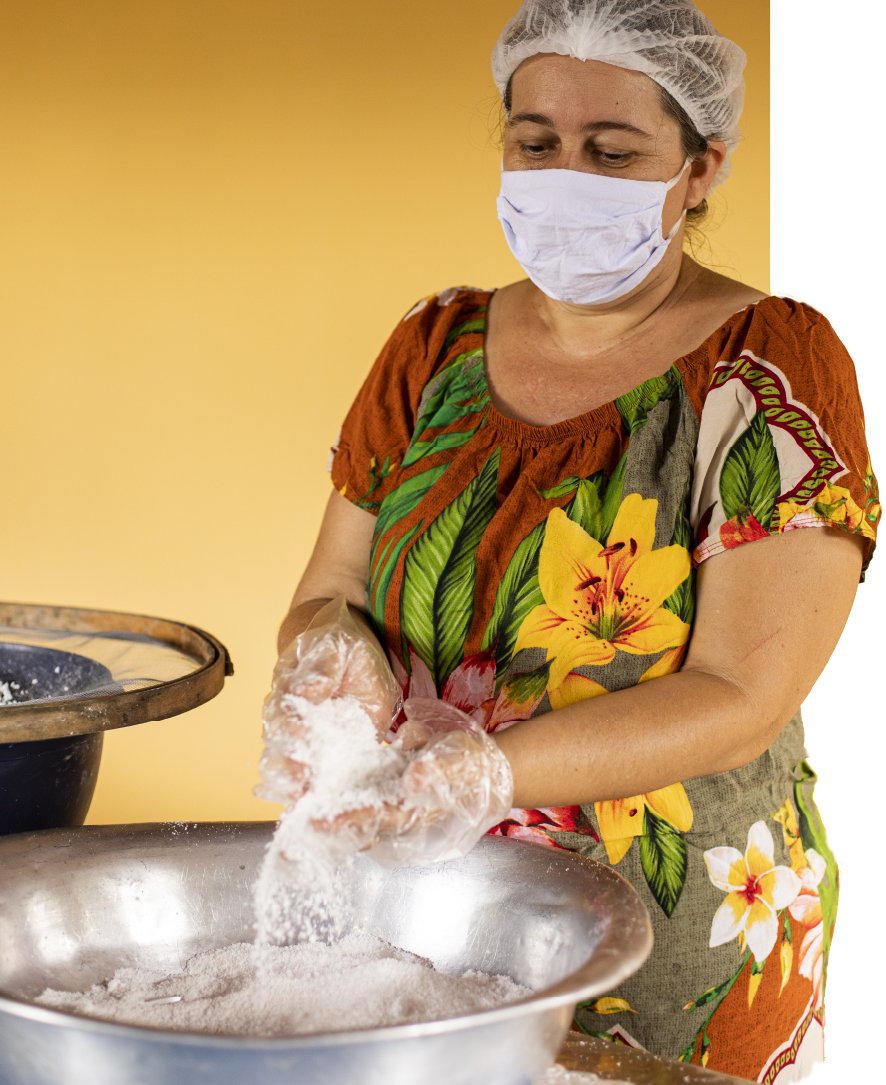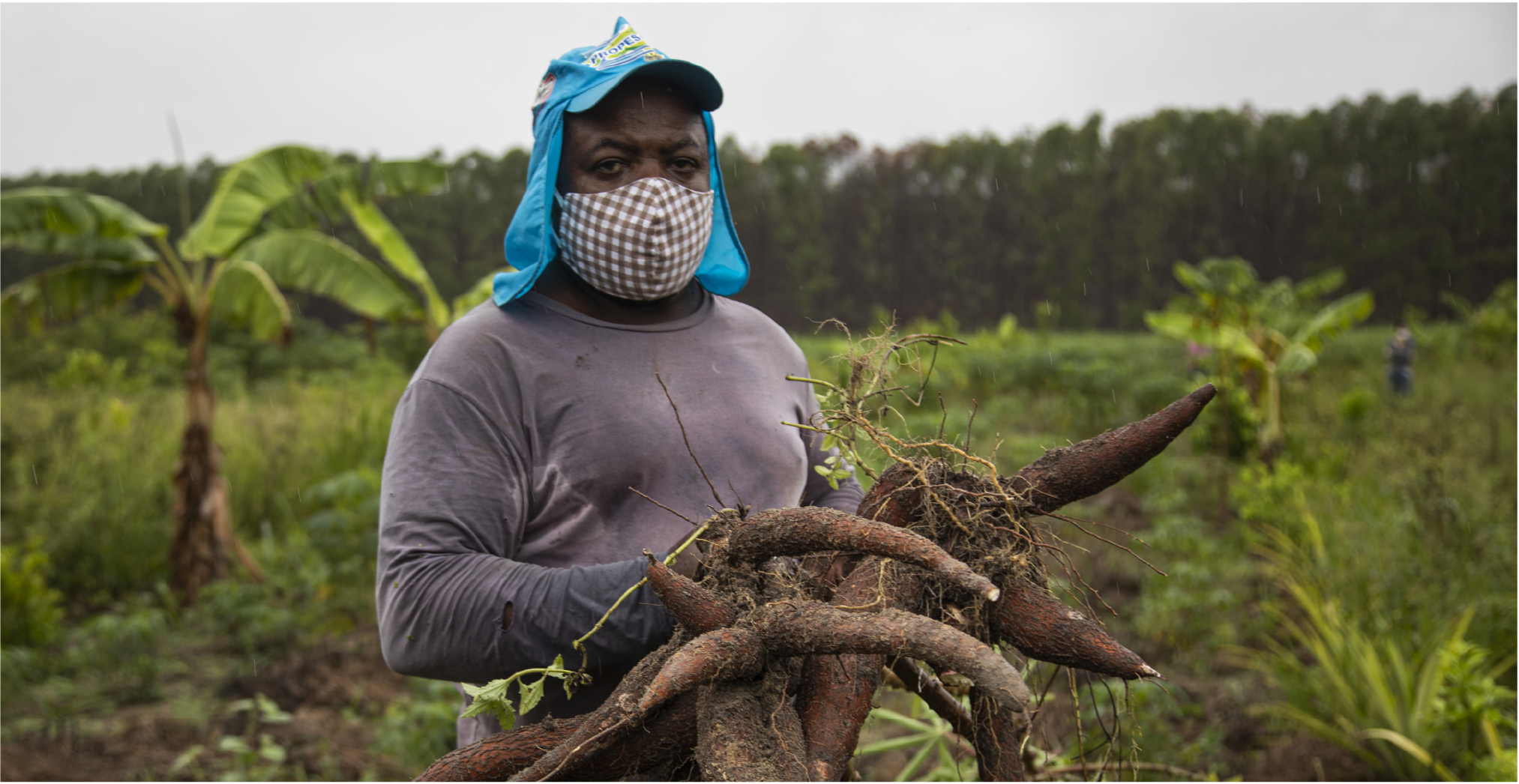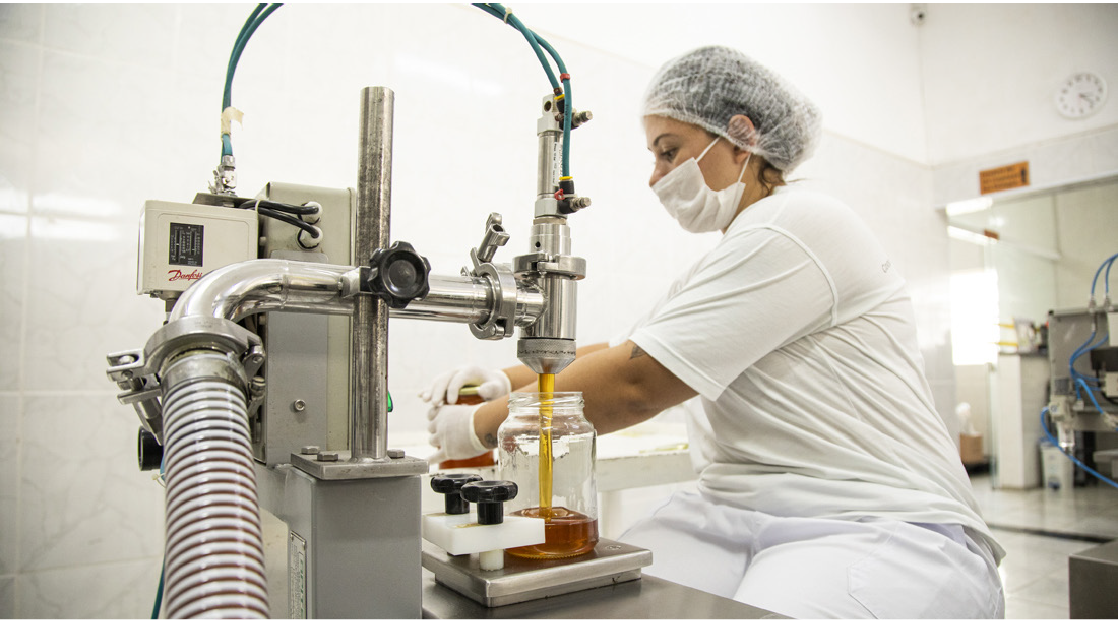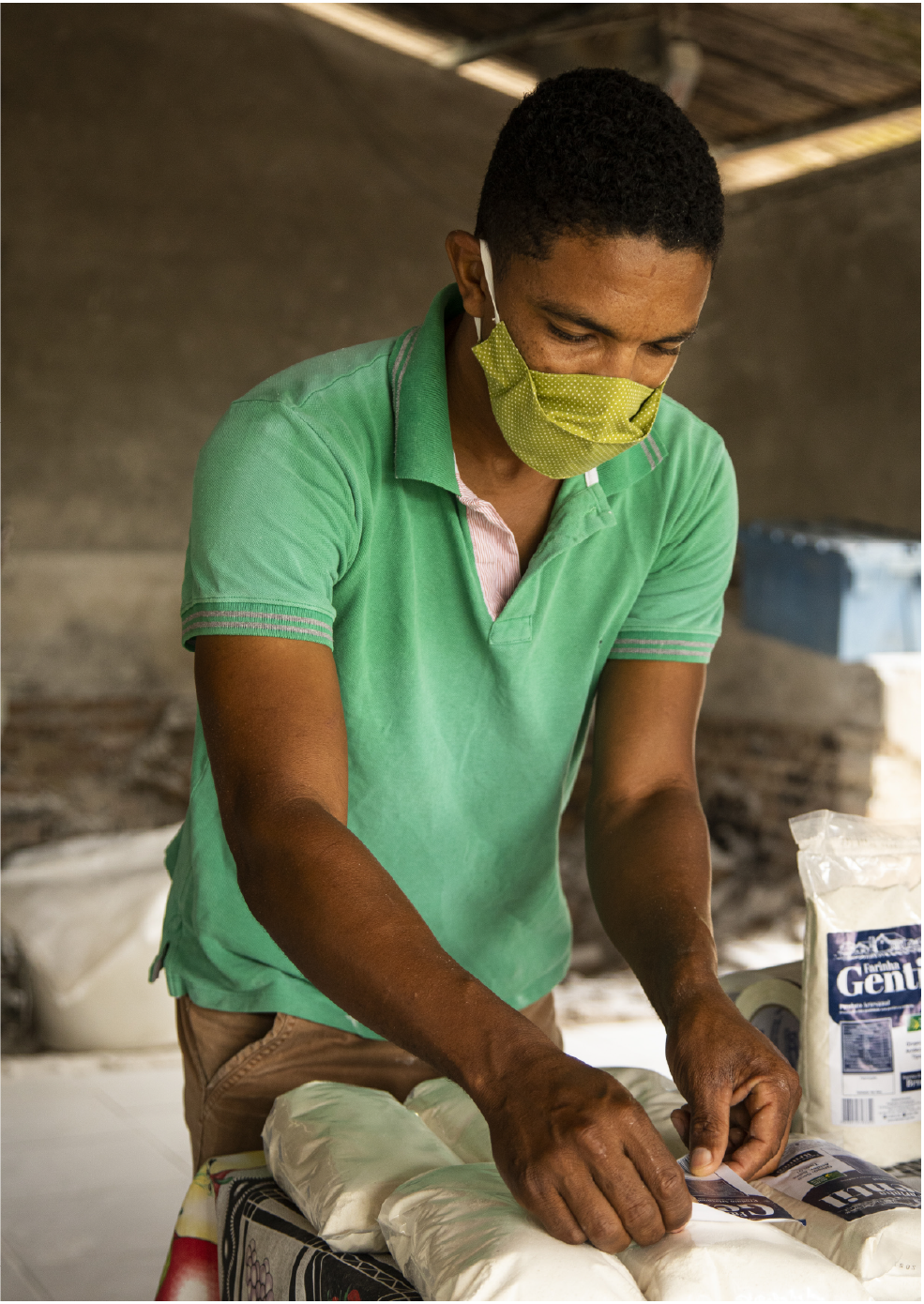
Community
Suzano believes that companies are important agents of transformation in society. Faced with such a challenging scenario caused by COVID-19, the company responded quickly and focused on supporting the communities, without neglecting its social strategy and existing projects.
Associated material topic:

CLOSER TO COMMUNITIES
GRI 103-1, 103-2, 103-3
At the beginning of 2020, Suzano’s expectation was to dedicate efforts to the evolution of social strategies and processes and proceed with its existing projects and programs related to this topic. The COVID-19 pandemic, however, created complex and urgent needs regarding the company’s relationship with communities. The first major challenge was to understand how the company should deal with the problem. Based on analyses of the global scenario and the hundreds of commitments that we have with neighboring communities, we decided to preserve resources and retain our capacity to serve the communities, considering the possibility of an extended crisis.
We continued with our programs and projects and concentrated our efforts on developing new methodologies and new ways of operating. At the same time, based on partnerships and engagement with communities, we studied as many ideas as possible, in order to face the social and economic impacts of the pandemic in the most vulnerable regions where we operate. This task force resulted in a set of initiatives called Emergency Actions, which benefited 55,028 people in 8 states (Bahia, Espírito Santo, Minas Gerais, Mato Grosso do Sul, São Paulo, Maranhão, Pará, and Tocantins), and in the construction of a field hospital in extreme southern Bahia and hundreds of donations of items and equipment used to prevent the disease (see table on the side). The materials were distributed by Suzano, together with the governments, including regions where the company operates. To this end, the needs of each state and municipality were taken into account, as well as the strategy established by health authorities to combat COVID-19.
We know that in 2021 the scenario imposed by the pandemic will continue to be challenging. Approximately 2.9 million people in the country are below the poverty line, according to the 2020 estimated population study conducted by the Brazilian Institute of Geography and Statistics (IBGE). Suzano is fully aware of its role in the joint construction of transformational solutions in society.
Emergency actions
In 2020, we launched a set of emergency actions aimed at three main targets: priority municipalities; groups and institutions with reduced income alternatives at the moment; and neighboring communities (urban and rural) with a high degree of socioeconomic vulnerability. The initiatives were planned to generate jobs and income, fight contagion by the virus and facilitate families’ access to aid from the federal government and states. The communities remained engaged and participated throughout the process in a climate of positive cooperation.
See the results of each action and the states benefited:

Emergency Call for Proposals
- R$600,000 invested in projects for rapid response to the impacts caused by the pandemic over a three-month period
- 70 locations served in 5 states (BA, ES, MG, MA, and PA)
- Support for small businesses and local and regional organizations
- Partnership with the Brazilian Fund for Biodiversity (FUNBIO)
- 469 projects received
- 53,469 people affected by the 121 projects approved and completed by December 2020
Protective masks
(in partnership with other companies)
- 498,000 masks manufactured by the community for sale
- R$900,000 in income generated
- 30 communities INVOLVED IN 7 STATES (BA, ES, SP, MS, MA, TO, AND PA)
- 332 seamstresses involved
Delivery of Food Staples Baskets
- 37,564 baskets sold and delivered by farmers to local residents
- More than R$1.1 million in total income generated
- 310 farmers FROM 39 COMMUNITIES MOBILIZED IN 5 STATES (BA, ES, MA, MS, AND SP)
- 308 tons of food sold
Access to public policies
During the pandemic, most of the families who benefit through our programs were directly affected, either by the reduction of consumer market options for their products or by the difficulty in receiving reliable information on benefits offered by municipalities, states, and the federal government. Thus, the technical teams of our programs established a plan to provide continuous guidance to these families, thereby securing their access to emergency assistance and to guidebooks with preventive measures focused on specific audiences, such as farmers, fishermen, quilombolas, and Indigenous people. We also support the development of projects by associations submitted in response to emergency calls for proposal issued by governments, such as Bahia Produtiva (Bahia state government) and the federal government, Food Acquisition Program (PAA – Programa de Aquisição de Alimentos).
- Thousand of families assisted
- 90 associations IN 5 STATES (BA, ES, MA, PA AND TO)
- R$400,000 raised and 8 projects approved in the Bahia Produtiva call for proposals
- R$1 million raised, 65 families benefited, and 16 projects approved through the Food Acquisition Program
RESILIENT TERRITORIES
GRI 103-1, 103-2, 103-3
Since Suzano defined its social strategy, the qualified income generation process has been strengthening year after year. Now, with its Long-Term Goals disclosed in February 2020, the company has established a new level of social performance to be achieved, requiring gains in scale and scope. This is because two of the commitments are directly linked to income generation and education, important aspects for which, hand in hand with communities, we want to build innovative and sustainable solutions.
In line with these commitments, we prepared to build and debate the evolution of the Resilient Territories strategy. The goal of this strategy is to use all the knowledge developed by Suzano and other players in the regions where the company operates and has maintained community relations over the years to influence public processes and policies that benefit an increasing number of people and regions.
- The meaning of territory for Suzano
The group of municipalities with which Suzano maintain close relation and has economic, social, political, environmental, and/or cultural influence.
- What are resilient territories?
They are socioeconomically diverse territories that are less vulnerable and better prepared to deal with changes, complexities, crises, and multiple disruptions (of an economic, environmental, technological, social, or political nature), avoiding economic collapse and preserving their resource base, which is why they are more sustainable in the long run. - How does a territory develop resilience?
It is critical that Suzano has a systemic approach that considers not only all of its operational, institutional, environmental, and social influence and impact, but also its ability to connect with other relevant social players through strategic partnerships that leverage local potential and create environments for mutual cooperation. A company, in this case, can act as process coordinator, but never as the leader. Leadership has to come from the territory.
The development of a region is not limited to social and environmental programs. The company has to understand the extent of its impact upon the territory, which goes beyond the positive return of these projects. Factors such as training of skilled labor, tax collection, and proper supplier relationship management contribute to the resilience of the territory and to pulling people up from the poverty line. In this sense, Suzano plans to take advantage of all the experience acquired through projects such as income generation programs, which today benefit around 4,000 families, to influence the state and, thus, establish partnerships to provide greater reach and coverage of the initiatives in the territories.
The Aracruz (Espírito Santo state) and Mucuri (Bahia state) units implemented a pilot project for Resilient Territories in December 2020, as they are very challenging from a social standpoint. The other units are expected to implement the project throughout 2021.

A new index
Another concept that Suzano put a lot of effort in 2020, and which complements the resilient territory strategy, is related to the Multidimensional Poverty Index. The purpose of this indicator is to understand which aspects influence or reinforce people’s vulnerability, such as education, access to public services, and housing conditions.
Our public commitment to pulling 200k people up from the poverty line is related to economic poverty: household per capita monetary poverty. However, the idea is that Suzano will expand this view in the coming years, based on the multidimensional poverty indicator. The concept is already used by the World Bank, but there are no references of companies that have developed this instrument. Therefore, we are going to establish the parameters and all governance rules, traceability, and audit processes in order to give maximum consistency and transparency in measuring the progress of the goal of pulling people up from the poverty line.
COLLECTIVE CONSTRUCTION IN COMMUNITIES
Social organization and autonomy are key for communities to address their socioeconomic demands and evolve in the long run. The company shares knowledge and information with the parties involved and, based on this data, establishes a common vision for the development of a given community and region, based on prioritizing initiatives and defining roles and responsibilities.
Suzano understands that community engagement implies collective construction and, therefore, invests in groups rather than individuals. Thus, in partnership with our neighbors and guided by dialogue and transparency, we put in place action plans for communities and monitor them annually, in addition to having a short-, medium-, and long-term transition plan, which expresses where families and communities want to be in five years. It should be noted that all actions result from an agreement, in which Suzano makes direct investments or assumes an advocacy role, depending on each situation.
Also, as the groups we work with become more prominent and self-sufficient, the company can reduce investments in structures and equipment. Thus, at the end of the process, we hope to have established a productive relationship between Suzano and the community, with learning and benefits for all those involved.
Suzano’s community relations methodologies follow guidelines that can be found in the Indicators Center.

Suzano Education Program
The Suzano Education Program (PSE – Programa Suzano de Educação) was launched in 2020. It is an initiative that invests in the improvement of public education through the professional development of Board of Education teams, school administrators, and teachers, as well as through the engagement of families and communities in the education project for the territory.
In its first year, the PSE managed to be present in 29 municipalities in 6 Brazilian states (Bahia, Espírito Santo, Maranhão, Mato Grosso do Sul, Pará, and São Paulo), serving 898 schools and benefiting 11,713 educators and 205,504 children and young people. With these positive results, the idea is to expand the program in the coming years. See more information in the Indicators Center.

Relationship with quilombolas and Indigenous people
Suzano’s relationship with quilombola communities is more intense in the states of Espírito Santo and Bahia. In addition, the company has a series of initiatives in place and maintains an open dialogue with more than 12 Indigenous tribes. To learn more about this topic, go to the Indicators Center.
Ecofuturo: environmental knowledge and conservation
In line with Suzano’s sustainability strategy and reinforcing Suzano’s social and environmental commitments, Instituto Ecofuturo—an organization founded by the company in 1999—develops actions focused on environmental conservation and promotion of knowledge. As the manager of Parque das Neblinas, our reserve with 7,000 hectares of Atlantic Forest, the Institute gave support to two on-site surveys in 2020, in partnership with the Luiz de Queiroz School of Agriculture, of the University of São Paulo (Esalq/USP), and with USP’s Biosciences Institute. It also launched the mini-documentary Onde a Natureza Faz História to disseminate the work carried out with rural landowners and, adapting to the changed scenario, provided a distance learning platform with free courses on environmental education and incentives for reading. More information is available on Ecofuturo’s website.